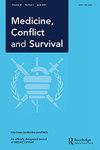How can healthcare systems become more resilient to the impacts of climate change?
Q3 Medicine
Medicine, Conflict and Survival
Pub Date : 2023-09-01
Epub Date: 2023-07-11
DOI:10.1080/13623699.2023.2231692
引用次数: 0
Abstract
A child born in 2023 faces a far more unpredictable future than we have known for decades. Since the 1960s, the number of weather-related natural disasters has tripled (“Climate Change and Health” n.d.) and the past year saw the breaking of temperature records on every continent (“2022 Saw Record Temperatures in Europe and across the World | Copernicus” n.d.). Collectively, these changes threaten the health, environment and food security of billions of people. Despite the unequivocal body of evidence for accelerating climate change, fossil fuel production continues to expand, weakening our hold on global warming targets agreed to secure future planetary health. The degree of global anxiety for the health of the next generation is plain in the publication of guidance in 2019 on how to ‘ensure that the health of a child born today is not defined by a changing climate’ (Watts et al. 2019). The burden of climate change impacts will not be shared equally – of 250,000–400,000 predicted extra deaths from malnutrition, malaria, diarrhoea and heat stress, 88% will be amongst children, and 99% in lowand middleincome countries (“Climate Change and Health” n.d.). Even amongst developed healthcare systems, climate change will act as a risk multiplier, strengthening intergenerational cycles of adversity by placing the most vulnerable populations at highest risk of climate-related health conditions. Without urgent and systemic intervention, existing health inequities will widen, with the potential to reverse the health and development gains of the last 50 years (“Human Development Report 2011Sustainability and Equity: A Better Future for All | United Nations Development Programme” n.d.).医疗保健系统如何才能对气候变化的影响更有弹性?
本文章由计算机程序翻译,如有差异,请以英文原文为准。
求助全文
约1分钟内获得全文
求助全文
来源期刊

Medicine, Conflict and Survival
Medicine-Pathology and Forensic Medicine
CiteScore
1.80
自引率
0.00%
发文量
46
期刊介绍:
Medicine, Conflict and Survival is an international journal for all those interested in health aspects of violence and human rights. It covers: •The causes and consequences of war and group violence. •The health and environmental effects of war and preparations for war, especially from nuclear, radiological, chemical and biological weapons of mass destruction. •The influence of war and preparations for war on health and welfare services and the distribution of global resources . •The abuse of human rights, its occurrence, causes and consequences. •The ethical responsibility of health professionals in relation to war, social violence and human rights abuses. •Non-violent methods of conflict resolution.
 求助内容:
求助内容: 应助结果提醒方式:
应助结果提醒方式:


